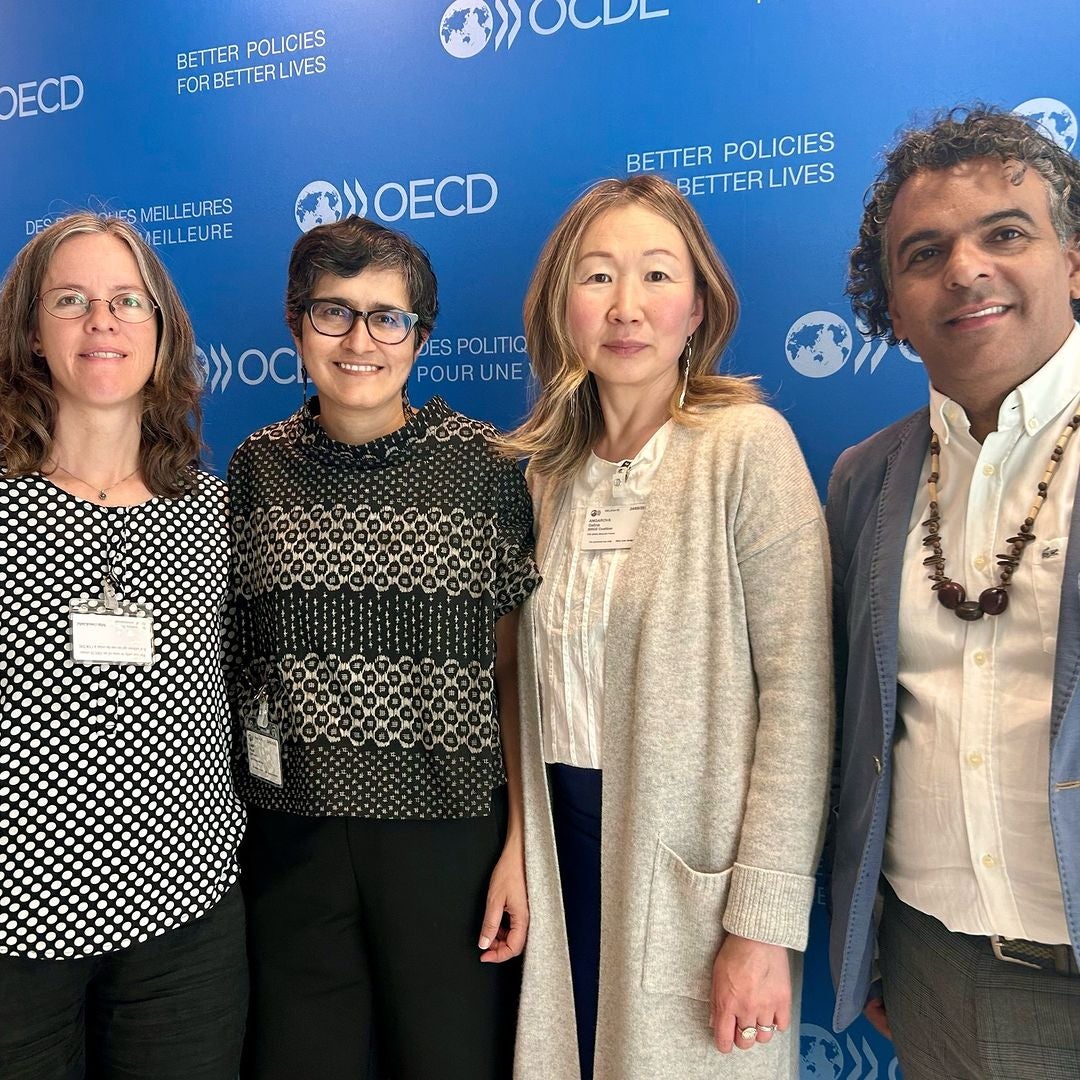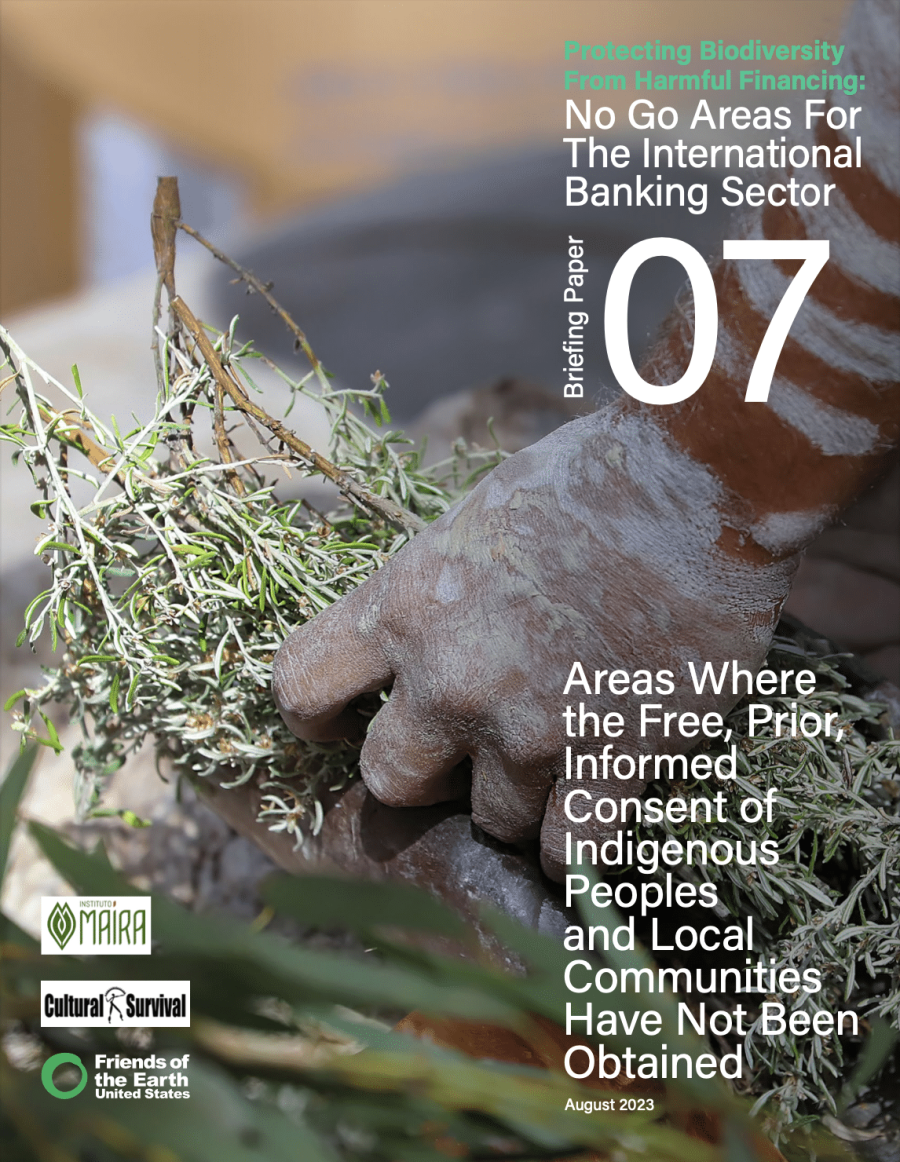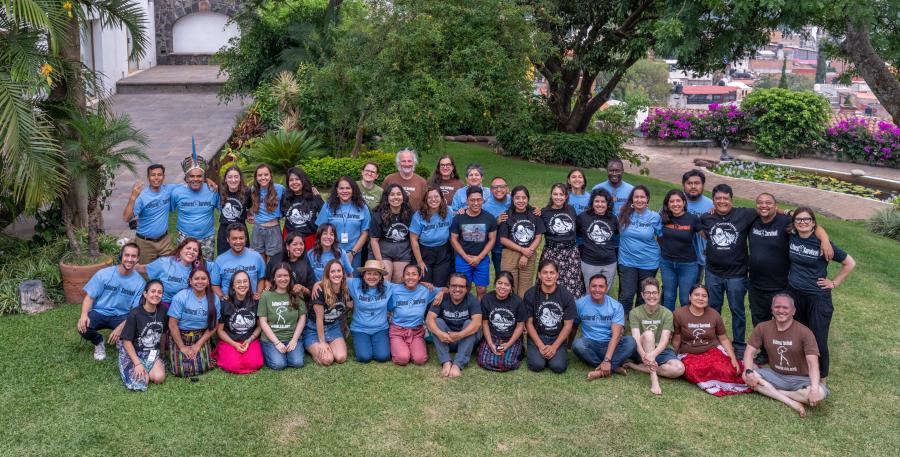
By Edson Krenak (Krenak, CS Staff)
On May 21-24, 2024, members of Cultural Survival and the SIRGE Coalition attended the Organization for Economic Cooperation and Development (OECD) Forum on Responsible Mineral Supply Chains in Paris. This article shares some of the key highlights and concerns to offer potential solutions to the multi-level crises we face. It also provides a critical analysis of the OECD's role and suggests measures to prevent the continuation of colonial patterns of inequality and unfairness.
The OECD comprises 38 member countries, including the United States, Canada, Mexico, Colombia, and Chile, providing a platform for these countries to discuss and analyze policies concerning governments, industry, health, education, climate, and land resources. It has a compliance mechanism, the National Contact Point (NCP), which works though extra-judicial dispute resolutions and conciliations for issues related to the application of the OECD guidelines. Each country must provide an NCP office.
Despite great interest of Indigenous advocacy in the OECD Forum, Indigenous Peoples’ participation in the event is still developing. Cultural Survival and the SIRGE Coalition were effectively the only Indigenous organizations fully participating. This was quite surprising, given that Indigenous Peoples in many countries face significant challenges involving natural resources. Since we participated in the forum for the first time last year, we have had promising dialogues with several actors, especially allies and other human rights organizations, founders, and investors. Below is a brief analysis of the most important points.
Indigenous Advocacy at the OECD
In preparation for the 2024 OECD Forum on Responsible Mineral Supply Chains, we joined several experts for a virtual press conference organized by Burness Communications. The event brought case studies from Myanmar, Tanzania, Russia, Australia, and Brazil, highlighting mining practices that hinder the objectives of the so-called green energy transition by failing to ensure that mineral and metal supply chains are free from environmental and human and Indigenous rights abuses.
The event was moderated by Galina Angarova, member of the Ekhirit Nation of the Buryat Peoples and Executive Director of the SIRGE Coalition. Participants discussed the South American cases of the “Lithium Triangle” of Argentina, Bolivia, and Chile, and Jequitinhonha Valley, Brazil. Adam Anthony, Executive Director of Publish What You Pay, presented the Tanzania case. Other participants included Dr. Deanna Kemp, professor at the University of Queensland and an international expert on the economic, social, and political challenges facing the global mining industry from an Australian perspective, and Ben Ayre, Senior Data Investigator at Global Witness and co-author of an embargoed study on the environmental and human rights impacts of rare mineral mining in Myanmar. Journalists learned about the necessary safeguards to prevent conflicts arising from mining activities that undermine national development goals, violate Indigenous and local community rights, and damage irreplaceable biodiverse ecosystems.
The legal scenarios in South America, especially Brazil, as well as in Myanmar and Tanzania, vary substantially. In Myanmar, there’s a spread of unregulated mining. The country is a significant source of heavy rare-earth elements, which are at the core of the geopolitical issues involving the West and China and are used in critical “clean” technologies such as electric vehicles and wind turbines. Ayre noted that "in the last two years, these mining operations have expanded at an unprecedented rate." In contrast to Myanmar, Brazil boasts one of the best legal frameworks in the world, with a strong Federal Constitution, protection mechanisms, and recognition of Indigenous Peoples and local communities and their rights. However, even within this robust legal context, rights are being trampled (see articles 1 and 2 ) in the rush to meet the demands for the green energy transition and to provide a stable supply of raw materials to the world.
Despite Brazil's strong legal protections for Indigenous rights, the reality that these communities face, especially in areas undergoing mineral extraction like lithium mining, is quite different. Take, for instance, a region containing eight percent of the world’s lithium deposits. Here, local communities have suffered greatly since lithium mining started about four years ago. The companies involved promised minimal environmental impact with a dry mining technique, but that hasn't been the case. Communities are dealing with constant blasting, discolored water, health issues, and sick and dying fish. Additionally, bats and insects are attacking children—far from what was initially promised.
Mining companies are adept at exploiting loopholes and manipulating situations to their advantage. Since the beginning of the mining operations, local communities have grappled with devastating environmental impacts, even though the mining companies have issued assurances that their dry mining methods would not cause significant harm.
If we talk about responsible—not just sustainable—mining and environmental protection, there is some hope. When communities participate in Free, Prior and Informed Consent (FPIC) consultations, are involved in the decision-making process, and have the freedom to consent or not, things change.
FPIC and community engagement are more than just checkboxes on a company's website. They are crucial for the credibility and success of environmental initiatives that Indigenous Peoples participate in at every level of governance, and for business practices to transform. The disregard for community rights has far-reaching consequences. It leads to the loss of centuries-old Traditional Knowledge and ways of life. Our Elders and scientists underscore that these traditions are essential for maintaining forests and protecting the world's remaining biodiversity. By not respecting community rights, we are endangering ecological and cultural heritage.
The OECD Forum is an international event where industry, governments, investors, researchers, and civil society gather to discuss policies and build networks. Indigenous advocates have a crucial role to play in these settings. Here are some of the things we worked towards:
- Representation and advocacy for the inclusion of more Indigenous voices:
We are satisfied that discussions about Free, Prior and Informed Consent were featured in several side events. The violation of Indigenous Peoples’ and communities’ rights was also a significant issue addressed in multiple sessions, especially the opening event, “Too many abuses, too few benefits?” This event was organized by the Business Human Rights Resource Center for the launch of their Transition Minerals Tracker, which tracks the impacts of transition minerals mining on Indigenous Peoples and local affected communities and offers perspectives on enhancing engagement and benefit-sharing of these resources. The research they have gathered over the past decade indicates a persistent lack of respect for land rights, a disregard for public participation rights, and the neglect of Indigenous Peoples' rights.
- Influence of policy and standards:
By participating in the forum, we aim to influence policies and standards to ensure they reflect the needs and rights of Indigenous communities. This includes advocating for stricter regulations and better enforcement to protect Indigenous lands and resources. For decades, we have been discussing voluntary due diligence and so-called soft laws (usually international), and our communities are tired of the slow pace of changes. We have to start talking about FPIC as a binding mechanism for any extractivist activity. The same strong principles that guide the fight against corruption must be used to fight the destruction of our environments.
- Addressing of irresponsible State and corporate practices
We focused on highlighting, preventing, and mitigating the negative impacts of irresponsible practices by States and corporations. This includes transparency and accountability—two aspects that are critical for communities to monitor what is going on in their territories and seek justice in case of violations. Governments and corporations often exchange roles and grant each other excessive leeway to make decisions without considering Indigenous Peoples' voices. Some corporations blame States for the human and Indigenous rights violations that occur in the various countries they are operating within. States will claim in rebuttal that they trust industry policies to guarantee the protection of the environment and Indigenous territories. However, it is the State's obligation to ensure these protections.

Members of the Executive Committee of the SIRGE Coalition at the OECD: Silvia Schönenberger, Programme Manager for Climate Justice and Indigenous Peoples' Rights, Society for Threatened Peoples; Payal Sampat, Mining Program Director at Earthworks; Galina Angarova (Buryat), Executive Director, SIRGE Coalition; and Edson Krenak (Krenak), Advocacy Coordinator, Cultural Survival.
Engagement with different actors: what is the message?
We engaged with 23 international media outlets, including Newsweek, Politico, and various European media, thanks to our partner, Burness. Journalists from many countries and media outlets are frequently shocked at these forums to witness States and industries discussing millions of dollars in investments, profits, and projects while the Indigenous communities whose lands and resources have been taken to enrich them are left with damage, loss, poverty, and minimal benefits in almost all cases.
While discussing, implementing policies, and creating the so-called just transition—a narrative that States and industries use to combat fossil fuels and climate change—we see a double-edged sword. On one hand, the so-called clean energy policies improve their public image and purportedly do good for the planet. On the other hand, the activities demand more minerals, more mining, and more legal flexibility, which causes damage and destruction to biodiversity in Indigenous territories, compromises Indigenous cultures, and disrespects their rights. The sword that is being used to fight the climate crisis is also killing Indigenous communities.
Our message is clear: stop the lies of the “green” economy, stop destroying the environment, and respect Indigenous Peoples' rights. The main recommendation is that Indigenous Peoples must be at the forefront of policy and decision-making that impacts their territories and livelihoods both directly and indirectly. The OECD must redefine what development truly means, because there is no real development if the solutions come at the expense of people’s territories and lives. The current discourse on securing critical minerals for the green transition fails to consider the historical and ongoing injustices faced by Indigenous communities. Corporate extraction and state mandates, often framed as solutions or sustainability policies, mask deeper issues with devastating consequences not only for Indigenous Peoples, but also for other traditional communities and the environment.
OECD and the legacy of its members
A forum cannot be the only approach to solving a problem, even one convened by an important institution like the OECD. It is essential to consider the colonial legacy of dispossession and bio-cultural losses that connect the State and corporate policies in the long history of exploiting resources without consent, disregarding Indigenous knowledge, and inflicting environmental damage. This pattern continues with the scramble for critical minerals under a new narrative: the green energy revolution.
The OECD frames State mandates and corporate responsibility initiatives as appealing and promising development and protection for all. However, these promises are often broken, and true responsible policies are never implemented. Environmental, Social, and Governance (ESG) ratings, touted as solutions, are easily manipulated and fail to address the power imbalance between corporations and Indigenous communities. A primary example is the NCP. The biggest problem of NCPs and other international mechanisms created to protect Indigenous Peoples is weak and inconsistent implementation. Many complaints do not result in concrete improvements for affected communities due to lack of enforcement power, impossibility of sanctions on companies found to be in violation of the guidelines, and limited political will as a result of governmental alignment with powerful companies.
A path forward
Indigenous Peoples can offer a true path toward a just and sustainable future through fundamental and transformative shifts in State and company behavior. Here is a summary of our proposal at the Forum:
- Free, Prior and Informed Consent (FPIC): Indigenous communities must have the right to decide what happens on their lands, including any mineral extraction, before it happens. There are some non-negotiable limits, for example, water and sacred sites, which must be protected and remain untouched. Voices from Argentina and Brazil spoke out:
“Our concern was always the amount of water that was going to be consumed in this extractive activity. What is already happening and what [will] happen in the future is that we are going to run out of water. Our main interest is water.” - Don Clemente, Kolla, Argentina
“The Environmental Protection Area protects us from drought, as it has 139 cataloged water springs by national authorities and research institutes. It supplies the Giral Quilombola and many families in Córrego do Narciso. Additionally, the region is rich in medicinal plants with knowledge passed down through generations by Indigenous and Quilombola communities, as cited in the history of Giral.” - Lucas Martins, Quilombola, Brazil
- Indigenous Knowledge Integration: The rich knowledge of Indigenous communities on sustainable resource management should be central to decision-making. FPIC also plays a role because it signals the effective participation of Indigenous communities to be part of policy-making that impacts their communities and territories.
- Benefit Sharing and Co-management: Agreements should ensure Indigenous communities benefit directly from resource extraction, not just corporations and governments. Mining and State projects are already present in many of our lands and territories, but very little has changed positively for our communities. OECD must create and promote projects to develop policies and management projects to share the wealth with communities on their terms. Significant benefit sharing is not crumbs, but transformative and permanent benefits.
- Stronger grievance mechanisms: Transparent and accessible systems are needed to address violations and hold corporations and States accountable. We have witnessed enough violations and crimes against Indigenous communities and environmental defenders.
Cultural Survival Executive Director, Aimee Roberson (Choctaw and Chickasaw): “According to a Global Witness 2022 report, almost 40 percent of murdered environmental defenders were Indigenous, a disproportionately high figure given that Indigenous Peoples comprise roughly 6 percent of the global population. Cultural Survival’s noncomprehensive data shows 77 Indigenous defenders were murdered in 2023 in Latin America alone, one of the most dangerous regions to be an Indigenous rights and environmental defender…These figures prove systematic persecution is taking place against Indigenous defenders as a result of their opposition to mega-projects, infrastructure development, mining for transition minerals, and other actions undertaken without their Free, Prior and Informed Consent.” (CSQ 48-2 Defend the defenders, Protect the Protectors).
If OECD member states and organizations continue to focus on securing minerals at any cost and disregard Indigenous rights, the violent and criminal pattern will remain. We need strong actions from those organizations. At the UN level, the reality is not so different (see Undermining Indigenous Peoples’ Rights: The Ongoing Struggle for Recognition in UN Environmental Agreements). With proper support, Indigenous Peoples can build partnerships based on mutual respect and environmental responsibility, but their security is critical. Only then can we achieve a truly sustainable future.



